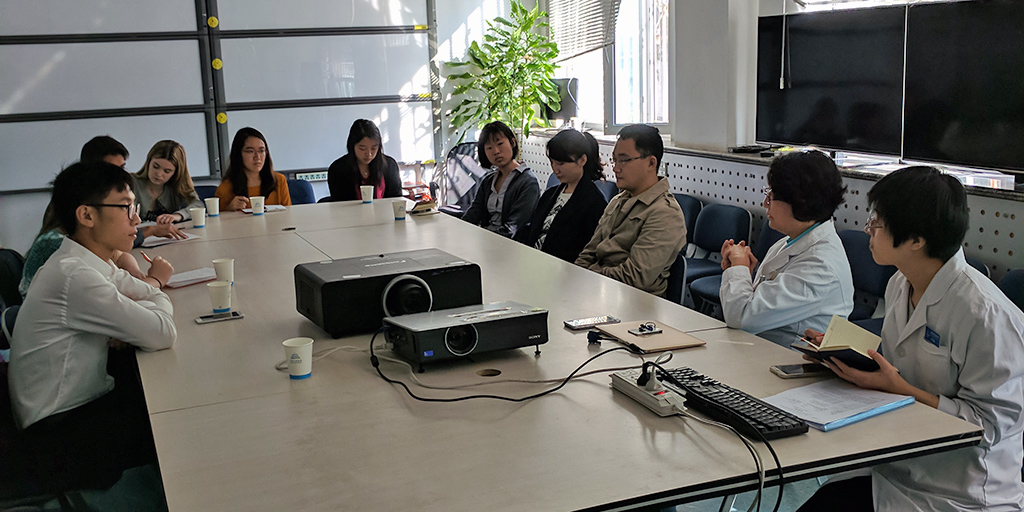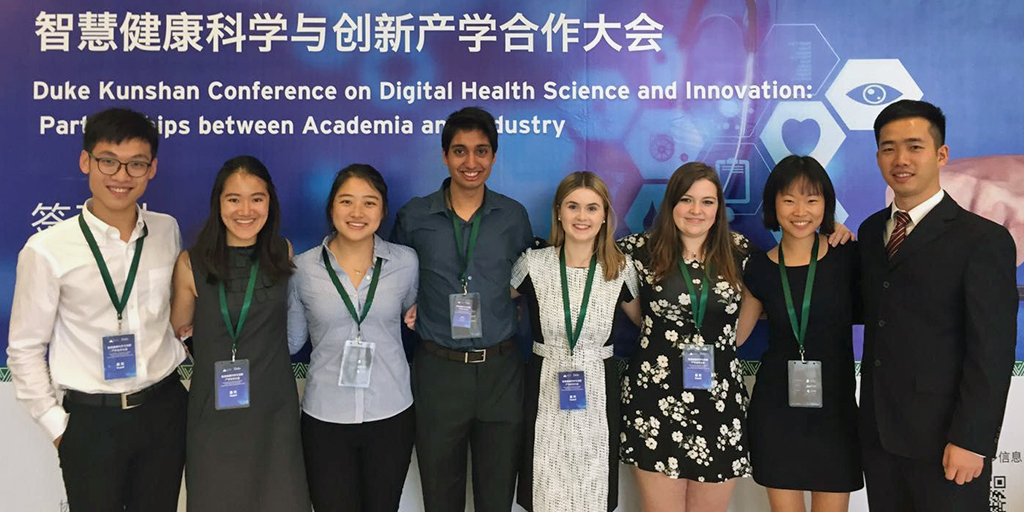Leveraging Technology and Cross-sector Partnerships to Improve Stroke Care in China
November 20, 2017
By Lillian Blanchard, Chunxi Ding, Alexandria Hurley, Chelsea Liu, Sahil Sandhu, Jackie Xu and Natalie Yu

Fragmentation in healthcare is a major barrier globally to high-quality care and good population health. Although it is problematic in the Chinese healthcare system, the prevalence of technology in China has opened the opportunity to connect stakeholders across components of the healthcare system and across sectors, who can work together to bridge the gaps. Seven members of our Bass Connections team traveled to China during fall break to learn more about healthcare infrastructure and the use of technology.
We are focusing on stroke in China with the goal of improving transitions across components of the care continuum.
Our Bass Connections team, Global Alliance on Disability and Healthcare Innovation (GANDHI), studies comparative health systems and explores outcomes related to disability after acute hospitalization. This academic year, we are focusing on stroke in China with the goal of improving transitions across components of the care continuum. These include health promotion and public health prevention interventions in the community, stroke symptom awareness and FAST response for treatment, acute hospital care, rehabilitation therapy, follow-up care in outpatient settings and home care.

To better understand these different levels in the Chinese healthcare system and the different stakeholders addressing healthcare fragmentation, we visited an academic institution, a public hospital and a private health service organization. Our visit with Xun Tang, PhD, MHS and his research team at the Peking University School of Public Health introduced us to studies aimed to improve disease risk prediction models for China by redesigning statistical formulas developed in Western settings. We were also introduced to two communities that have created an integrated data system across all components of health care and learned how researchers at Peking University have partnered with the local authorities and health care providers to begin studying that population’s health.
Using hospital-based electronic stroke care registries, the team at Tiantan is leading national research on stroke care quality to improve care and outcomes.
Our visit to Tiantan Hospital began with an introduction to stroke care and research in China from Dr. Liping Liu, Director of the Neurological Intensive Care Unit. With one of her doctoral students, we walked through a typical stroke patient’s experience at Tiantan Hospital. We learned about the transitions patients experience from when stroke symptoms begin, when they arrive at the emergency department, are admitted to intensive care, moved to a general ward and discharged home with an expectation to follow up with a neurologist. Using hospital-based electronic stroke care registries, the team at Tiantan is leading national research on stroke care quality to improve care and outcomes.

On our last day in Beijing, we visited Pinetree Rehabilitation Nursing, a privately owned in-home care service for older patients who have had an acute hospitalization. Pinetree provides healthcare mainly via remote communication, phone calls and door-to-door visits. Currently available in major cities including Beijing, Shanghai and Hangzhou, Pinetree plans to extend their in-home care services to other regions of China as well, demonstrating the widespread demand for care outside of traditional hospital settings. Pinetree has proven the potential for industry to promote innovative practices in Chinese healthcare.
We interviewed experts to learn their perspective on partnerships for facilitating improved health with digital health technology.
We ended our trip by visiting Duke Kunshan University, where we attended the Duke Kunshan Conference on Digital Health Science and Innovation: Partnerships between Academia and Industry. We interviewed experts to learn their perspective on partnerships for facilitating improved health with digital health technology. The discussions and presentations at the conference encouraged us to think critically about our three experiences in Beijing. While Peking University, Tiantan Hospital, Pinetree Rehabilitation all played critical roles in the care continuum for patients, they each represented a different perspective: academia, government and industry, respectively. All three leveraged new technologies to improve stroke patient outcomes, but greater collaboration across these sectors is still needed.

Ultimately, health system strengthening requires collaboration across academia, government and industry. Fostering a culture of interdisciplinary collaboration can never start too early. Of the seven Bass Connections team members who went to China, no two had the same majors. Our majors include ECE (electrical and computer engineering), public policy, psychology, computer science, biology, cognitive science (Program II) and global health. Every team member engaged in this experience with a unique lens and asked different questions. Moving forward, we hope to integrate these perspectives to develop innovative solutions in addressing the global burden of stroke and other noncommunicable diseases.

Originally posted on the GANDHI project website
Learn More
- Read about this Bass Connections project team.
- Explore Bass Connections in Global Health.
- Browse stories from students on their Bass Connections experience.
Photos courtesy of the Bass Connections GANDHI team
